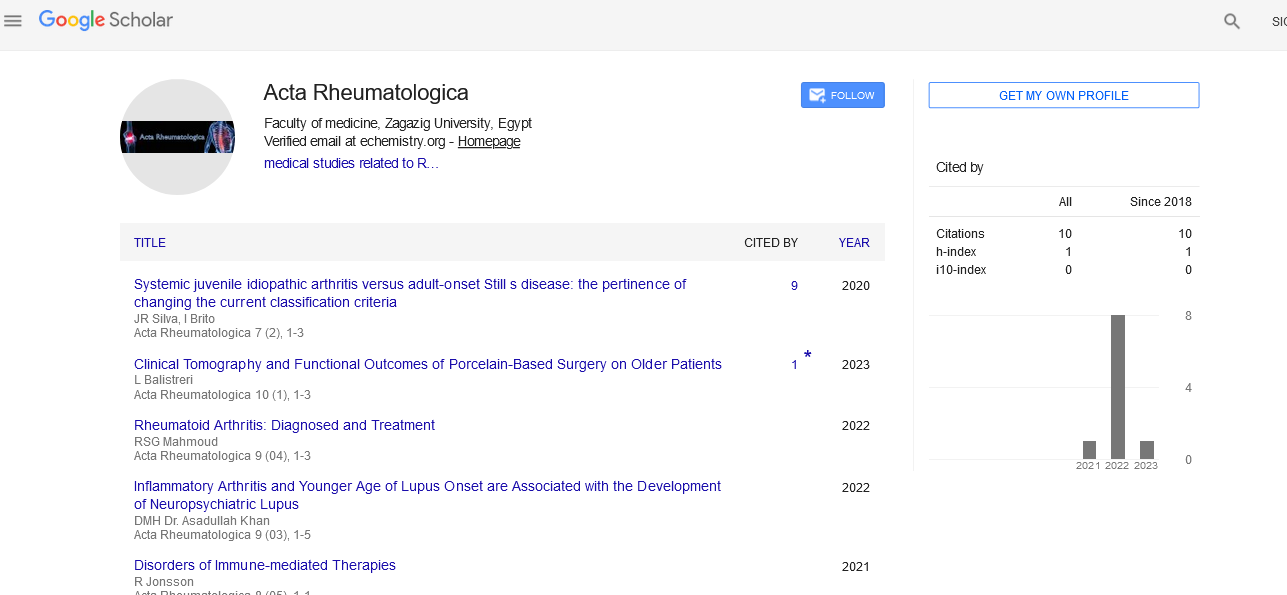Perspective - (2024) Volume 11, Issue 6
The Impact of Smoking on Rheumatoid Arthritis Progression
Essam H. Dhandapani*
Department of Medical Sciences, Vydehi Institute of Medical Sciences and Research Centre, Bangalore, India
*Correspondence:
Essam H. Dhandapani, Department of Medical Sciences, Vydehi Institute of Medical Sciences and Research Centre, Bangalore,
India,
Email:
Received: 12-Nov-2024, Manuscript No. IPAR-24-15240;
Editor assigned: 15-Nov-2024, Pre QC No. IPAR-24-15240 (PQ);
Reviewed: 29-Nov-2024, QC No. IPAR-24-15240;
Revised: 10-Dec-2024, Manuscript No. IPAR-24-15240 (R);
Published:
17-Dec-2024
Introduction
Rheumatoid Arthritis (RA) is a chronic autoimmune disease
characterized by inflammation of the joints, leading to pain,
stiffness, and eventual joint damage. While genetic and
environmental factors contribute to the development and
progression of RA, smoking has emerged as a significant
modifiable risk factor. This article explores the impact of
smoking on the progression of rheumatoid arthritis, examining
the mechanisms involved, clinical implications, and strategies for
patient management.
Understanding rheumatoid arthritis
RA primarily affects the synovial joints, resulting in
inflammation that can cause erosion of bone and cartilage. The
disease often presents with symmetrical joint involvement,
morning stiffness, and fatigue. While the exact cause of RA
remains unclear, it is believed to arise from a combination of
genetic predisposition and environmental triggers, with smoking
identified as a critical contributor.
The connection between smoking and RA
Numerous studies have established a strong association
between smoking and the development of RA. Smokers are not
only more likely to develop the disease, but smoking is also
linked to more severe disease manifestations. The prevalence of
smoking among individuals with RA is significantly higher
compared to the general population, underscoring its role as a
potential risk factor.
Description
Mechanisms linking smoking to RA progression
Understanding the biological mechanisms by which smoking
influences RA progression can help elucidate its detrimental
effects:
Inflammation and immune response: Smoking activates the
immune system, leading to chronic inflammation. Tobacco
smoke contains numerous toxic compounds that can stimulate
the production of pro-inflammatory cytokines, exacerbating the immune dysregulation characteristic of RA. This heightened
inflammatory response can lead to increased joint damage.
Autoantibody production: Smoking has been associated with
the production of specific autoantibodies, such as Anti-
Citrullinated Protein Antibodies (ACPAs). These antibodies are
commonly found in RA patients and are linked to more aggressive
disease progression. The presence of ACPAs in smokers may
indicate a heightened risk for severe disease outcomes.
Altered gut microbiota: Emerging research suggests that
smoking may influence gut microbiota composition, which in
turn can affect systemic inflammation and immune responses.
Dysbiosis, or an imbalance in gut bacteria, has been implicated in
various autoimmune diseases, including RA.
Bone and cartilage damage: Tobacco smoke can negatively
affect bone health and repair mechanisms. Studies indicate that
smoking may lead to increased bone resorption and reduced
bone formation, heightening the risk of osteoporosis and joint
damage in RA patients.
Clinical implications of smoking in RA patients
The impact of smoking on rheumatoid arthritis progression
has important clinical implications:
Disease severity: Research indicates that smoking is
associated with increased disease activity and severity in RA
patients. Smokers often experience more significant joint
swelling, pain, and functional limitations. This exacerbation of
symptoms can lead to a diminished quality of life and increased
healthcare utilization.
Treatment response: Smoking may also influence the response
to conventional and biologic Disease-Modifying Antirheumatic
Drugs (DMARDs). Studies suggest that smokers may have a poorer
response to certain treatments, potentially complicating disease
management. For instance, smoking has been linked to reduced
efficacy of methotrexate, one of the cornerstone treatments for
RA.
Comorbidities: Patients with RA are already at risk for various
comorbidities, including cardiovascular disease and osteoporosis.
Smoking exacerbates these risks, leading to higher rates of
cardiovascular events and fractures in RA patients. The combination of these comorbidities can further complicate the
management of RA and negatively impact overall health.
Strategies for smoking cessation
Given the substantial impact of smoking on RA progression,
effective smoking cessation strategies are crucial for patient
management:
Screening and assessment: Healthcare providers should
routinely screen RA patients for smoking status and assess their
readiness to quit. This information can help tailor cessation
strategies and interventions.
Counseling and support: Behavioral counseling and support
play a vital role in successful smoking cessation. Providers can
offer resources, including counseling services, support groups,
and educational materials to help patients understand the
benefits of quitting.
Pharmacotherapy: Several pharmacotherapeutic options are
available to aid in smoking cessation. Nicotine Replacement
Therapies (NRTs), such as patches and gum, and prescription
medications like varenicline and bupropion can be effective
tools. These options should be discussed with patients to
identify the best approach based on individual needs.
Follow-up and relapse prevention
Continued follow-up is essential to support patients in their
efforts to quit smoking. Regular check-ins can help reinforce positive behaviors, address challenges, and reduce the likelihood
of relapse. Encouraging participation in smoking cessation
programs can also provide additional support.
Conclusion
Smoking is a significant modifiable risk factor in the
progression of rheumatoid arthritis, impacting disease severity,
treatment response, and overall health outcomes.
Understanding the mechanisms by which smoking exacerbates
RA provides critical insights for healthcare providers and
patients alike. By prioritizing smoking cessation as part of a
comprehensive treatment plan, rheumatologists can help
mitigate the adverse effects of smoking and improve patient
outcomes. As research continues to unveil the complexities of
RA and its relationship with smoking, ongoing education and
support will be vital in empowering patients to make informed
decisions about their health and well-being. Through a
multifaceted approach, it is possible to enhance the quality of
life for individuals living with rheumatoid arthritis while
addressing one of the key modifiable risk factors impacting their
condition.
Citation: Dhandapani EH (2024) The Impact of Smoking on Rheumatoid Arthritis Progression. Acta Rheuma Vol:11 No:6





